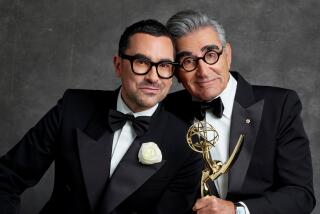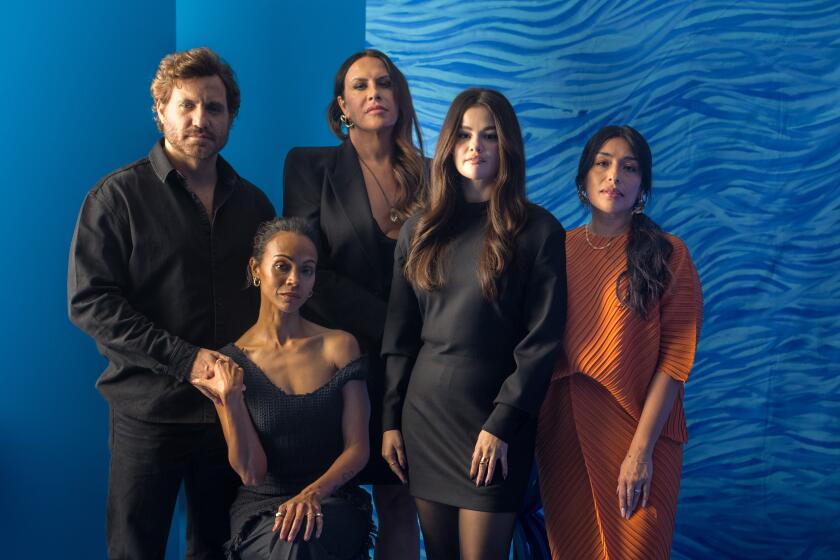Oscars 2014: Does the telecast have to be a joke fest?
So Ellen DeGeneres is set to host the 86th Academy Awards next week. Nothing against her or, for that matter, Billy Crystal (who has hosted nine telecasts), Whoopi Goldberg (who has hosted four) or Steve Martin (who has done three), but when was it decided that this most glamorous awards show needed to be funny to sustain an audience?
After all, it’s not as if comedy so dominates the proceedings that only a professional comedian is worthy of hosting it. In fact, the opposite is true. Rarely has a comedy even been nominated for best picture, much less won. Not counting 1998 hybrid “Shakespeare in Love,” the last genuine comedy to win best picture was 1977’s “Annie Hall.”
And isn’t it odd that a tribute to the motion picture industry would require talk show hosts like Johnny Carson (who hosted five times), David Letterman (he hosted once) and DeGeneres (this is her second time), people associated almost exclusively with television, to do the honors? It’s a bit like baseball’s Hall of Fame asking Peyton Manning to handle its induction ceremony.
FULL COVERAGE: Oscars 2014 | Top nominees
I’m not saying we can’t have levity, it’s just that scripted comedy seems superfluous — for crying out loud, it’s an awards show, not a celebrity roast. Is the film academy afraid that the audience won’t stick around to see who wins if there isn’t a guffaw every 30 seconds?
How did this modest trophy presentation, begun as a private banquet in 1929, evolve into a joke fest? One theory: Once audiences responded positively to professional comedians, no one was willing to risk changing the format. No one wanted to be remembered as the guy who booked Max von Sydow when Jerry Lewis (thrice a host) was available.
Actually, the early shows were subdued, dignified affairs (Douglas Fairbanks and William C. de Mille hosted the first one). It wasn’t until the 1940 debut of Bob Hope that they shifted gears. During Hope’s 18 radio and TV appearances as host, he single-handedly transformed the ceremony into an evening of self-effacing humor and wicked zingers. Loath to tinker with success, subsequent producers not only preserved the format but also sanctified it.
PHOTOS: 14 awkward Oscar moments | TIMELINE: The Academy Awards
Or we might cite the “mirthification principle,” defined as the desire to punctuate all discourse with snappy punch lines, clever put-downs and witty comebacks, as evidence that we have mutated into a nation of laughter addicts. If this continues, we’ll one day see professional mimes at state funerals, laugh-track machines at the Department of Motor Vehicles and Jim Carrey in Stockholm, hired to punch up the Nobel Prize ceremony.
As an unrepentant movie buff who hasn’t missed an Oscar telecast since 1983, I’ve always regarded the Academy Awards as part competition, part spectacle and part infatuation, an opportunity for us incurable movie romantics to immerse ourselves for one glorious evening in Hollywood tradition and wretched excess.
With all the drama, the surprises, the speeches, the wonderful (at times) musical numbers — with this sparkling array of wall-to-wall Hollywood royalty — it’s puzzling why we require the additional stimuli of scripted jokes.
The academy should return to a more stately format and save the gags for cable TV, late-night talk shows and the comedy clubs. No, the host needn’t be Alan Greenspan. But what would the objection be to, say, Anthony Hopkins or Morgan Freeman?
Macaray is an L.A. playwright and author.
More to Read
Only good movies
Get the Indie Focus newsletter, Mark Olsen's weekly guide to the world of cinema.
You may occasionally receive promotional content from the Los Angeles Times.









